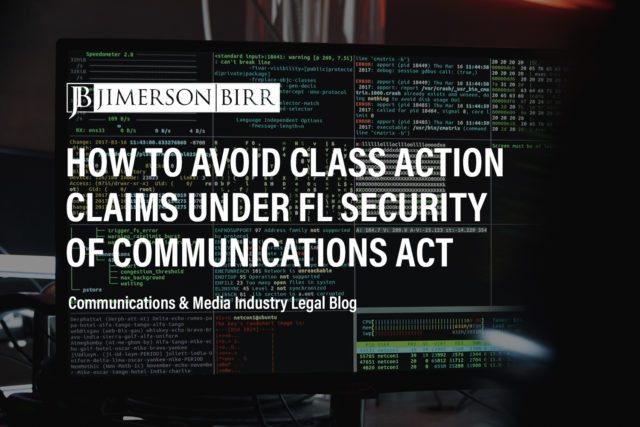How does First Amendment litigation affect communications and media companies?
First Amendment litigation significantly impacts communications and media companies operating in Florida. This form of litigation revolves around the protection of freedom of speech, expression, and press, as guaranteed by the First Amendment of the United States Constitution. Businesses in the communications and media sector often find themselves entangled in legal disputes related to freedom of speech, censorship, defamation, privacy rights, and access to information.
These litigations can arise from various scenarios, including challenges to media content, restrictions on advertising, disputes over access to public records, and conflicts with government regulations. For example, media organizations may face lawsuits alleging defamation or libel, while internet companies may confront legal challenges regarding censorship or content moderation policies.
Moreover, First Amendment litigation intersects with other areas of law, such as intellectual property, privacy, and antitrust, creating complex legal landscapes for communications and media companies to navigate. Therefore, understanding the nuances of First Amendment rights and limitations is crucial for businesses in this sector to protect themselves from legal liabilities and ensure compliance with applicable laws and regulations.
Need help regarding First Amendment litigation? Schedule your consultation today with a top communications and media attorney.
In Florida, which laws and regulations apply to First Amendment litigation?
In Florida, several laws and regulations govern First Amendment litigation concerning communications and media companies. The following statutes and legal frameworks provide guidance on the protection of free speech and expression rights:
- The United States Constitution: The First Amendment of the Constitution guarantees freedom of speech and of the press.
- Florida Constitution: Article I, Section 4 of the Florida Constitution guarantees freedom of speech and of the press, mirroring the protections provided by the First Amendment of the U.S. Constitution.
- Federal Laws: Federal statutes and regulations, including those enforced by the Federal Communications Commission (FCC) and the Federal Trade Commission (FTC), also play a role in regulating aspects of communications and media activities that implicate First Amendment rights.
What are common issues regarding First Amendment litigation?
The following issues are among the most common in actions regarding First Amendment litigation:
- Defamation Claims: Businesses may face lawsuits alleging defamation, including libel (written defamation) or slander (spoken defamation), which can arise from published content, statements made by employees, or customer reviews.
- Content Regulation Challenges: Disputes may arise over government regulations or restrictions on content, such as advertising regulations, obscenity laws, or limitations on political speech.
- Censorship and Content Moderation: Communications platforms and media outlets may be sued for censorship or biased content moderation practices that allegedly infringe on individuals’ freedom of speech rights.
- Access to Information: Businesses may face legal challenges related to access to public records or government information, including disputes over the release of sensitive data or confidential sources.
- Intellectual Property Disputes: First Amendment issues can intersect with intellectual property rights, leading to litigation over copyright infringement, trademark disputes, or allegations of misappropriation of trade secrets.
- Privacy Concerns: Businesses may be sued for invasion of privacy or violations of individuals’ privacy rights, especially in cases involving the publication of private information or unauthorized surveillance.
We are value-based attorneys at Jimerson Birr, which means we look at each action with our clients from the point of view of costs and benefits while reducing liability. Then, based on our client’s objectives, we chart a path to seek appropriate remedies.
To determine whether your unique situation may necessitate litigation, please contact our office to set up your initial consultation.
What steps should businesses take to minimize the risk of litigation over First Amendment litigation?
- Develop Clear Content Policies: Establish comprehensive content policies that outline acceptable practices for content creation, publication, and moderation, ensuring compliance with applicable laws and regulations.
- Provide Employee Training: Educate employees about First Amendment rights and responsibilities, including proper communication practices, content moderation guidelines, and compliance with privacy laws.
- Implement Robust Compliance Measures: Regularly review and update business practices to ensure compliance with evolving legal standards and industry best practices, including proactive measures to address potential legal risks.
- Engage in Alternative Dispute Resolution: Consider utilizing alternative dispute resolution methods, such as mediation or arbitration, to resolve First Amendment disputes efficiently and cost-effectively outside of court.
- Secure Legal Counsel: Retain experienced legal counsel specializing in First Amendment law to provide guidance on compliance matters, risk mitigation strategies, and representation in litigation if disputes arise.
- Maintain Transparency: Foster open communication with stakeholders, including customers, employees, and regulatory agencies, to address concerns, respond to inquiries, and maintain trust in the business’s commitment to free expression and compliance with legal standards.
Frequently Asked Questions
Can businesses be sued for content posted by users on their platforms?
Yes, businesses can potentially be held liable for user-generated content that violates laws or infringes on the rights of others, depending on the circumstances and applicable legal principles.
How can businesses protect themselves from defamation claims?
Businesses can minimize the risk of defamation claims by implementing robust content moderation policies, verifying the accuracy of information before publication, and promptly addressing any complaints or concerns regarding potentially defamatory content.
Are there limitations on the types of content businesses can publish under the First Amendment?
While the First Amendment protects a broad range of speech, certain categories of expression, such as obscenity, incitement to violence, and false commercial speech, may be subject to regulation or restriction under applicable laws and regulations.
Have more questions about a First Amendment-related situation?
Crucially, this overview of First Amendment litigation does not begin to cover all the laws implicated by this issue or the factors that may compel the application of such laws. Every case is unique, and the laws can produce different outcomes depending on the individual circumstances.
Jimerson Birr attorneys guide our clients to help make informed decisions while ensuring their rights are respected and protected. Our lawyers are highly trained and experienced in the nuances of the law, so they can accurately interpret statutes and case law and holistically prepare individuals or companies for their legal endeavors. Through this intense personal investment and advocacy, our lawyers will help resolve the issue’s complicated legal problems efficiently and effectively.
Having a Jimerson Birr attorney on your side means securing a team of seasoned, multi-dimensional, cross-functional legal professionals. Whether it is a transaction, an operational issue, a regulatory challenge, or a contested legal predicament that may require court intervention, we remain tireless advocates at every step. Being a value-added law firm means putting the client at the forefront of everything we do. We use our experience to help our clients navigate even the most complex problems and come out the other side triumphant.
If you want to understand your case, the merits of your claim or defense, potential monetary awards, or the amount of exposure you face, you should speak with a qualified Jimerson Birr lawyer. Our experienced team of attorneys is here to help. Call Jimerson Birr at (904) 389-0050 or use the contact form to schedule a consultation.

We live by our 7 Superior Service Commitments
- Conferring Client-Defined Value
- Efficient and Cost-Effective
- Accessibility
- Delivering an Experience While Delivering Results
- Meaningful and Enduring Partnership
- Exceptional Communication Based Upon Listening
- Accountability to Goals











